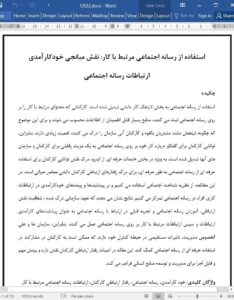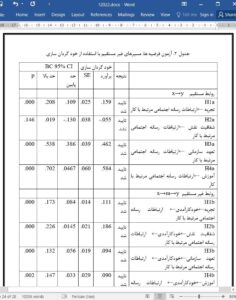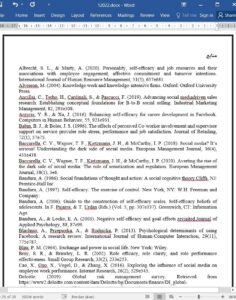Abstract
Social media use has become an indispensable part of knowledge work. Employees posting work-related content on social media are considered credible sources of information and have significant importance for how stakeholders, such as potential customers and future employees, perceive the organization. Therefore, employees’ ability to communicate about their work on social media has become a competitive advantage both for individual employees and for their organizations, especially in the professional service sector. Hence, understanding the role of employees’ ability to use these social media professionally is crucial for understanding the communicative behaviors of contemporary knowledge workers. In this study, we draw on social cognitive theory and focus on the antecedents and consequences of self-efficacy in individuals’ work-related communication on social media. The results show that perceived organizational commitment, clarity of communicative role, social media training, and prior experience with social media serve as antecedents of communication self-efficacy and subsequent work-related communication on social media. Thus, organizations and particularly management, have several aspects directly within the scope of their control that may aid employees in engaging in the professional use of social media. The paper contributes to the literature on employees’ communication behavior and provides important and actionable insights for management and the development of human resources.
1. Introduction
Organizations are increasingly adopting social media as a formal communication channel, which is changing the ways companies operate and relate to customers and providers (Paniagua, Korzynski, & Mas-Tur, 2017). In the EU area, for example, 75% of the companies that employ more than 250 people were using social media as a part of their operations in 2019, primarily to support image building and product marketing, to build and maintain customer relationships, and to recruit new employees (Eurostat, 2020). In addition, recent literature highlights the importance of social media communication by suggesting that customers are increasingly taking into account social media content, including content published by organizational members, when forming relationships and making buying decisions (Ancillai, Terho, Cardinali, & Pascucci, 2019).
6. Conclusions
Our research highlights the role of individuals’ SMC self-efficacy in understanding their social media use for work-related communication. In addition, the findings demonstrate that many factors underlying employees’ SMC self-efficacy are directly within the respective organization’s locus of control. As such, organizations can play an important role in educating and guiding their workforce to effectively utilize social media in a professional context. Based on our results, these organizational actions may include providing an environment where employees would feel supported, ensuring that they understand their communicative responsibilities, providing training, and allocating time for learning. Indeed, employees’ SMC self-efficacy increases the use of social media for work-related purposes, which may benefit individual employees and allow the organization to more effectively tap into the enormous communication potential of its members.










